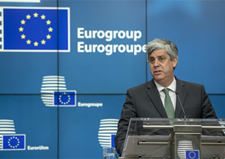Euro area finance ministers prepare work on EMU deepening and welcome Bulgaria’s commitment to participate in ERM II

date: 16/07/2018
See also: Eurogroup
During a Eurogroup meeting on 12 July euro area finance ministers discussed the outcome of the Euro Summit, which took place on 29 June. The discussions focused on work relating to the deepening of the Economic and Monetary Union, including terms of reference for the common backstop to the single resolution fund to be provided by the European Stability Mechanism (ESM), a term sheet for the further development of the ESM, and a roadmap for the beginning of political negotiations on the European Deposit Insurance Scheme. Ministers also discussed the summer interim economic forecast, the budgetary situation in the euro area, and the findings from post-programme surveillance missions to Spain and Ireland. In the margins of the Eurogroup meeting, representatives from the euro area Member States, the European Central Bank and Denmark met in the presence of the Commission and of Bulgaria to discuss Bulgaria's participation in ERM II. They welcomed commitments by the Bulgarian authorities to put in place the necessary elements for a successful entry into ERM II. At a meeting of the ECOFIN Council the following day, EU finance ministers concluded this year's European Semester exercise, the annual monitoring process aimed at ensuring economic convergence and stability in the EU. They also discussed a Commission proposal on a reverse charge mechanism that would in certain cases shift liability for final VAT payment from the vendor to the customer. The mechanism aims to reduce VAT fraud schemes, particularly those involving cross-border transactions between businesses. The ministers also discussed an e-publications proposal which would allow Member States to apply non-standard VAT rates to electronic publications and potentially align VAT rules between physical and electronic forms for publications.
